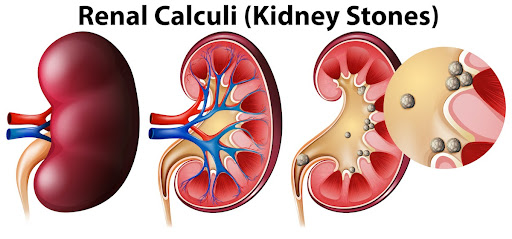Kidney stones medically known as renal calculi, are hard mineral and salt deposits that form within the kidneys or urinary tract. These stones can vary in size, from tiny crystals to larger, jagged formations, and they can cause significant discomfort and complications when they block the flow of urine or pass through the urinary tract.
The formation of kidney stones typically occurs when certain substances in the urine, such as calcium, oxalate, and uric acid, become concentrated and crystallize. Factors such as dehydration, dietary habits, genetics, and underlying medical conditions can contribute to the development of kidney stones.
The symptoms of kidney stones can vary depending on their size and location within the urinary tract. Small stones may pass through the urinary system unnoticed, while larger stones can cause intense pain and discomfort, often described as sharp and stabbing, radiating from the side and back to the lower abdomen and groin. Other symptoms may include:
Painful urination
Blood in the urine (hematuria)
Frequent urination
Urinary urgency
Nausea and vomiting
Fever and chills (indicating infection)
Diagnosis of kidney stones usually involves a combination of medical history, physical examination, imaging tests (such as X-rays, CT scans, or ultrasounds), and urine analysis to determine the size, location, and composition of the stones.
Treatment options for kidney stones depend on factors such as the size and location of the stones, as well as the severity of symptoms. Small stones may pass spontaneously with increased fluid intake and pain management. However, larger stones or those causing severe symptoms may require medical intervention, including:
Pain management: Over-the-counter or prescription medications to alleviate pain and discomfort.
Fluid intake: Drinking plenty of water to help flush out the stones and prevent new ones from forming.
Medical therapy: Certain medications may help dissolve certain types of kidney stones or prevent their formation.
Extracorporeal shock wave lithotripsy (ESWL): A non-invasive procedure that uses shock waves to break up kidney stones into smaller pieces that can be passed more easily.
Ureteroscopy: A minimally invasive procedure where a thin scope is passed through the urethra and bladder to remove or break up stones lodged in the urinary tract.
Percutaneous nephrolithotomy (PCNL): A surgical procedure to remove large kidney stones through a small incision in the back.
In some cases, dietary and lifestyle modifications may be recommended to reduce the risk of recurrent kidney stones. These may include reducing salt and animal protein intake, increasing fluid intake, and avoiding certain foods high in oxalate or purines.
Overall, kidney stones are a common condition that can cause significant discomfort and complications, but with proper management and treatment, most people can successfully pass or remove kidney stones and prevent their recurrence with appropriate lifestyle changes.





Comments